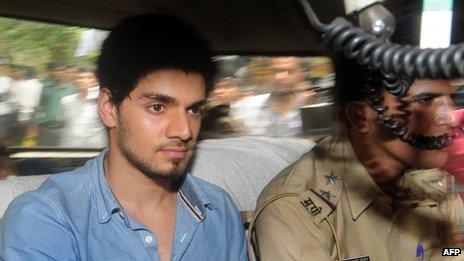Is India's suicide law being misused?
- Published
- comments

Suraj Pancholi was held on charges of abetting his actor girlfriend's suicide
Last year, more than 13,000 farmers, external killed themselves in India.
Most were saddled with steep debts, having failed to pay back loans they had taken from banks, micro-finance companies and money lenders after their crops failed. Farm suicides - nearly 300,000 since 1995 - are India's shame, a colossal national tragedy.
But, can the lenders be lawfully charged with abetting such suicides?
Going by India's laws, yes. The country's 153-year-old penal laws, external say abetting suicide, external can fetch the offender up to 10 years in prison and a fine.
In May, Sudipta Sen, a businessman who allegedly defrauded thousands of depositors in the eastern state of West Bengal, was charged, external with abetting the suicide of a "depressed" investor.

Jiah Khan's mother accused Mr Pancholi of abusing her daughter
So was Suraj Pancholi, who was arrested after his girlfriend, Bollywood actress Jiah Khan, killed herself last month.
Mr Pancholi spent time in prison after police announced they intended to charge him with abetment. He was bailed on Monday, with the judge saying he did not appear to have a motive for inciting his girlfriend to kill herself.
Tuesday's papers reported a similar incident, external. The former boyfriend of a film editor, who allegedly took her life, has been detained and charged with abetment of suicide in Mumbai. Reports said she had accused her boyfriend of rape and, more recently, he had called off their planned wedding.
India's Supreme Court has repeatedly said that to convict a person for abetting suicide, it has to be proved that they instigated the suicide or that "there was a clear intention, external to commit the offence".
"It's not easy to prove," leading lawyer KTS Tulsi tells me. "It's like showing the gun, showing the poison [to the victim] and telling him or her, 'go ahead and die'. That's the kind of active facilitation which is not easy to prove."
No wonder the conviction rate in cases of abetment to suicide is abysmally low - 1-2%, Mr Tulsi says. More than 135,000 people took their lives in India in 2012 - more men than women, and the majority of them married.
Mr Tulsi accuses the police of abusing the law. "The law is very clear about how abetment should be defined. Unfortunately, our police are not literate enough in grasping the finer definitions of laws. The result is unnecessary harassment of people," he says.
Legal experts believe India still needs the law, considering the large number of women who still take their lives following dowry demands. More than 8,000 dowry deaths, external were reported in India last year, according to the National Crime Records Bureau, external. A third of the offenders were convicted. Lawyers believe many of these convictions related to the suicide of a dowry victim were secured after proving the abetment charge.
However, India possibly needs to scrap the other colonial-era law that makes it illegal to take your life, external. It is a crime that can fetch you a year of prison time. England scrapped a similar law in 1961, but the former colony still persists with what many believe is a retrograde measure.